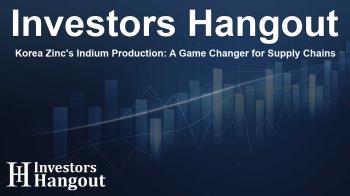Korea Zinc's Indium Production: A Game Changer for Supply Chains

Korea Zinc's Role in Global Critical Minerals Supply Chain
Korea Zinc is emerging as a vital player in the global critical minerals market, especially in light of recent export controls imposed by China. This precarious situation has intensified the importance of reliable sources for essential minerals, creating a stronger demand for what Korea Zinc can offer. Notably, Korea Zinc stands as the world's largest producer of refined indium, a metal that plays a pivotal role in various high-tech applications.
Impact of Chinese Export Controls
Recently, China heightened its export controls concerning five crucial materials, including indium, which has sent ripples through the international supply chain. While the export regulations are designed for national security, they have brought forth challenges for numerous countries that heavily rely on Chinese imports. Despite these hurdles, Korea Zinc has the unique advantage of being the dominant domestic producer of three of the five restricted minerals in South Korea, enabling it to safeguard a stable supply for local industries.
Domestic Production Stability
South Korea has recognized its significant reliance on imports for crucial resources—China is responsible for up to 85% of South Korea's tungsten and over 90% of its molybdenum imports. In light of the recent export restrictions, the South Korean government is undertaking an immediate assessment to pinpoint the implications for domestic sectors. Fortunately, South Korea's domestic production of indium, bismuth, and tellurium remains stable, largely due to Korea Zinc's concerted efforts to boost production and technological advancements.
Korea Zinc's Indium Production
Indium is a cornerstone of Korea Zinc's operations. The company efficiently recovers this critical metal from zinc concentrates as well as secondary materials processed through its advanced facilities. In doing so, Korea Zinc produces approximately 150 tons of indium per year, covering about 11% of global demand. As industries around the world scramble to secure supplies of this essential metal, Korea Zinc’s operations gain increasing relevance.
Global Demand Trends
Recent trends in the electronics and solar industries illustrate the rising need for indium. Its primary application is in ITO (Indium-Tin-Oxide), a vital component of flat-panel displays and touchscreens. Although market volatility impacted indium prices due to sluggish LCD TV sales, the demand in the solar sector remains robust, as indium is essential for thin-film solar technologies. Moreover, advancements in 5G technology have further heightened global indium consumption, making it increasingly critical for tech infrastructure.
The Future of Indium and Strategic Developments
Reports indicate that between 2020 and 2023, South Korea represented a substantial 29% of indium imports for the United States. As China reinforces its export controls, expectations are for this percentage to increase. This growth creates a more substantial partnership potential between South Korean and American industries, especially with discussions pertaining to rare metals like indium becoming more prevalent.
Commitment to technology and innovation remains a priority for Korea Zinc's leadership team, exemplified by the strategic vision of Chairman Yun B. Choi and CTO Lee Je-Joong. They acknowledge the significant role of rare metals in national infrastructure, promising to enhance recovery capabilities and ensure a consistent supply to meet both domestic and international needs.
Conclusion: Embracing Change and Innovation
Korea Zinc is strategically positioned to play a critical role in the evolving landscape of global supply chains, especially as industries pivot away from reliance on traditional suppliers. The company's proactive approach not only bolsters its position but also serves as an essential component in safeguarding economic stability and security amidst changing trade dynamics.
Frequently Asked Questions
What is the significance of Korea Zinc's indium production?
Korea Zinc's indium production is crucial for stabilizing supply chains as global demand grows, particularly amid export constraints from China.
How has China’s export control impacted the market?
China's export controls have heightened global awareness of supply chain vulnerabilities, pushing industries to seek alternative sources like Korea Zinc.
What are the applications of indium?
Indium is primarily used in ITO for electronics, as well as in solar panels, making it vital for technological advancements like 5G and AI.
How much indium does Korea Zinc produce annually?
Korea Zinc produces around 150 tons of indium each year, contributing significantly to the global supply.
What steps is Korea Zinc taking to innovate?
Korea Zinc is investing in advanced technologies to improve recovery rates for rare metals, enhancing overall supply chain efficiency and sustainability.
About The Author
Contact Olivia Taylor privately here. Or send an email with ATTN: Olivia Taylor as the subject to contact@investorshangout.com.
About Investors Hangout
Investors Hangout is a leading online stock forum for financial discussion and learning, offering a wide range of free tools and resources. It draws in traders of all levels, who exchange market knowledge, investigate trading tactics, and keep an eye on industry developments in real time. Featuring financial articles, stock message boards, quotes, charts, company profiles, and live news updates. Through cooperative learning and a wealth of informational resources, it helps users from novices creating their first portfolios to experts honing their techniques. Join Investors Hangout today: https://investorshangout.com/
The content of this article is based on factual, publicly available information and does not represent legal, financial, or investment advice. Investors Hangout does not offer financial advice, and the author is not a licensed financial advisor. Consult a qualified advisor before making any financial or investment decisions based on this article. This article should not be considered advice to purchase, sell, or hold any securities or other investments. If any of the material provided here is inaccurate, please contact us for corrections.

